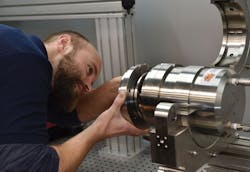HANNOVER, GERMANY – Does laser radiation react differently with the target material under high pressure? How do the extreme conditions of the deep sea affect machining processes? Laser Zentrum Hannover (LZH), an independent, non-profit research institute, can investigate these and other questions with a specially developed pressure chamber to simulate deep-sea conditions (FIGURE 1).
FIGURE 1. With the special pressure chamber, laser material processing can be tested under deep-sea conditions. (Courtesy: LZH)
With the pressure chamber, a 6500 m water depth can be simulated with pressure up to 650 bar. The chamber is suitable for both freshwater and saltwater, and can thus represent various application scenarios. The pressure chamber includes a special device in which the sample can be safely placed.
In the pressure chamber, two different viewing windows allow the introduction of laser radiation and observation of the process with a camera (FIGURE 2). Therefore, investigators (for example) can analyze the plasma formation on the surface of the sample. This is interesting for preparing deep-sea work and measurements, as in the current ROBUST project at LZH that focuses on the investigation of mineral resources on the seabed.
FIGURE 2. The pressure chamber has a viewing window through which laser radiation can be introduced. (Courtesy: LZH)
Furthermore, the chamber can be used to examine different materials for their reaction to high pressures underwater. Using high-speed camera technology, LZH can record full-HD video material at over 12,000 images/s and synchronize it with the pressure curve in the chamber.
For more information, please visit www.lzh.de.

